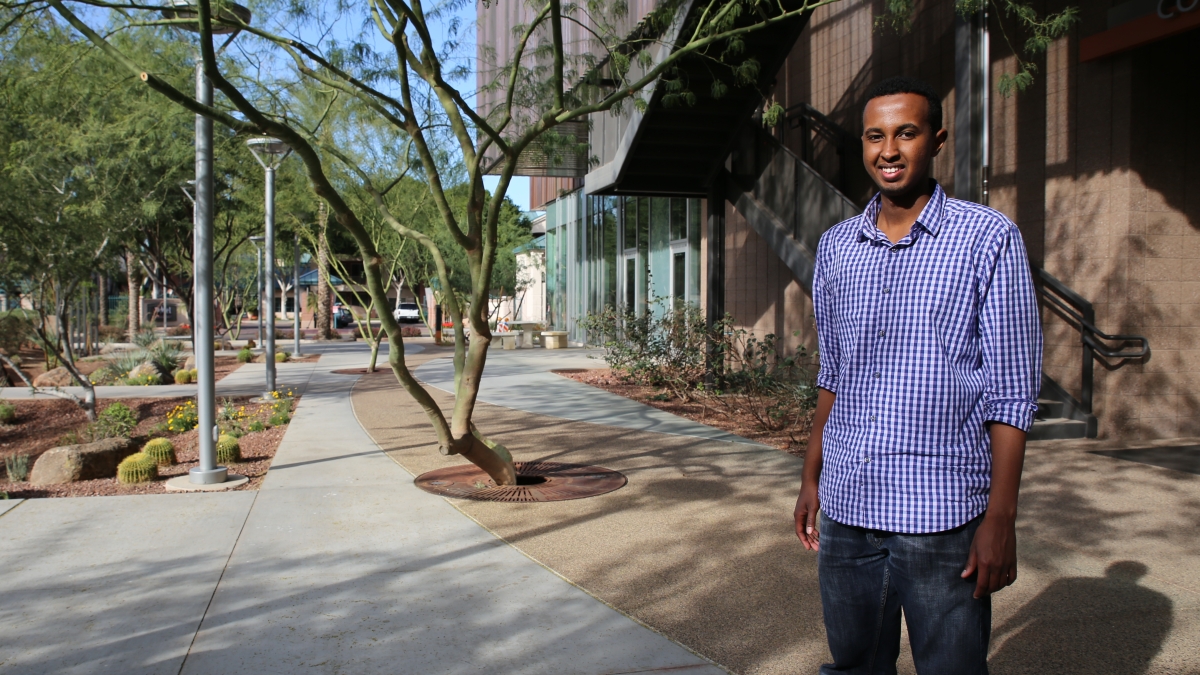Global perspective gives ASU student insight, determination to improve health care

Editor's Note: This story is part of an ongoing series about student excellence at the university. To read more about some of ASU's outstanding students, click here.
When Mohamed Arif left Somalia in 1989 with his mother, grandmother and aunts, he was only a year old. Civil war had just broken out the year before. Located on the east horn of Africa, Somalia has suffered famine, drought, political instability and war for decades.
“My mother made it sound like a nice trip, better than where we came from, and that it would be fun, that we would have hope,” he said.
Arif and his family moved from Somalia to Tunisia, where they stayed for a year before moving to Egypt. They eventually landed in Holland, where they spent a couple of years in three different refugee camps. By that time, Arif was four years old.
“One of the biggest struggles for a family living in the refugee camp is the sense of isolation, the feeling that you and those in the camp are closed off from the rest of the world,” he said.
When Arif and his family left Holland for Arnhem in the Netherlands, they were able to move into their first real home since fleeing Somalia.
“Although I was young when my family moved out of the camp, I do remember feeling happy to move into a city where we could live a stable life,” he said. “My family had the opportunity to learn the language, work, have access to a variety of social services and be part of the Dutch society.”
Arif’s father eventually left Somalia with a stop in Egypt before coming to America. When Arif was 10 years old, he and his mother and sister joined his father in Phoenix, where they live today.
Yet the memories of Somalia’s violence remain difficult for Arif’s parents, who lost relatives, neighbors and close friends in the war.
“Famine can be solved by logistics,” Arif said, now a 25-year-old master’s student in ASU’s Science of Health Care Delivery program. “We have enough food and water to feed the world. Warlords, tribalism and the lack of intergovernmental cooperation prevent the people who need the resources the most from getting access.”
Arif speaks with clarity and conviction about the unnecessary suffering and disparities in Somalia and other parts of the world, including here in the United States.
“Politics and health care problems are system problems,” he said. “People are inherently good, but we don’t hear each other out.”
It was during his undergraduate years as a political science major that Arif learned about international policy and how governments operate. As he worked with his professors on his capstone, he discovered an interest in health care issues.
“I came to the realization that we spend a substantial amount of money on health care here in the U.S., and have some of the most renowned hospitals in the world, top doctors, access to the latest innovative drugs and medical technology, yet our health care system continues to underperform at the national level,” he said. “I wanted to know why this was happening."
As his interest in health care grew, Arif started asking questions: Why are some of our national health care outcomes worse than some developed countries? Why is our health care system so fragmented? How can we raise the quality of care for all?
“Those questions are what sparked my curiosity and interest in the field of health care delivery,” he said.
“When you have someone with his perseverance, his experience dealing with change and his determination to make things better, you have someone who will make a difference,” said Victor Trastek, one of Arif’s professors and his mentor in the program.
Arif and his classmates in the program’s first cohort have been learning how to evaluate and solve some of the most pressing systems issues in health care today.
“Our professors are helping us think on a systems level about connections, parts of a system, how to adapt and how to make things better,” he said. “And we’re solving problems in interdisciplinary ways because systems problems cannot be addressed from one perspective.”
Denis Cortese, director of ASU’s Health Care Delivery and Policy program and one of Arif’s professors, said that the amount of information and breadth of treatments for patients is so vast and growing that no one person can retain and apply the best knowledge for the best interest of each patient.
“Health care delivery is now a complex adaptive system,” Cortese said. “The program teaches students how to understand the outcomes and costs in health care today, to evaluate gaps in the system, to learn from the best providers who are obtaining the best results, to study and adapt, or modify their practices to reproduce the best results or create their own new solutions.”
While Arif is focused on a future where disparities are eliminated and the system works for everyone, he also remembers a time when his family first came to the U.S., and they found themselves struggling with another form of isolation.
“My family was uninsured for a long time; we fell through the cracks, and it was really tough because my mother had asthma,” he said. “In a country like this, it shouldn’t be happening.”
When he graduates in May with his master’s degree, Arif plans to go into health care administration, where he will focus on system improvements that will reduce health disparities and raise the quality of care locally and globally.
“Patients are vulnerable and sick,” he said. “Graduates of my program will be there to solve a problem that will help another human being get better, no matter what role we play in the health care system.”
Written by Denise Kronsteiner, denise.kronsteiner@asu.edu, (602) 496-0983
Media contact: